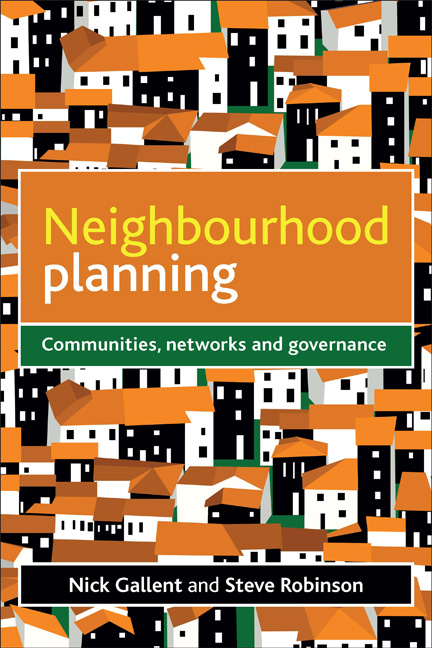Book contents
- Frontmatter
- Dedication
- Contents
- List of figures, images and table
- Abbreviations
- Acknowledgements
- Authors’ note
- Part One Democracy, planning and localism
- Part Two Capacity building and community-based planning
- Part Three The interface with policy actors
- Part Four Neighbourhood planning, leadership and democratic renewal
- References
- Index
eleven - Working through intermediaries
Published online by Cambridge University Press: 07 September 2022
- Frontmatter
- Dedication
- Contents
- List of figures, images and table
- Abbreviations
- Acknowledgements
- Authors’ note
- Part One Democracy, planning and localism
- Part Two Capacity building and community-based planning
- Part Three The interface with policy actors
- Part Four Neighbourhood planning, leadership and democratic renewal
- References
- Index
Summary
In Chapter Nine, ‘intermediaries’ were characterised as ‘brokers’, negotiating a relationship between the community and policy actors. It was suggested that such intermediaries bridge the potential divide between community groups looking to put together plans, and either the planning authority – that might be looking to use the neighbourhood perspective in some way – or service providers, which might be steered by the content of a community-based plan. Given the thrust of local government reform in the 2000s – delivering Labour’s own brand of ‘new localism’ – and the creation of structures designed to open up policy processes to a broader array of local actors, it has been hypothesised that the LSP, or some future equivalent, might play this type of role (Bishop, 2007; Owen et al, 2007). On the other hand, there may well be incidental ‘weak ties’ acting as go-betweens, and that these might include ward members sometimes pushing particular community agendas or residents with informal connections to one or more stakeholders. Some evidence of the latter was highlighted in the last chapter, with employees of the local authority bringing issues of community concern to the attention of colleagues. But overall, only very weak evidence of such ties was found. And while some stakeholders view the LSP, with its corporate connections, as a potentially important ‘broker’ between policy actors and communities, this did not appear to be the prevailing state of affairs. This issue, and the apparent failure of this local governance apparatus, is examined in the first part of this chapter. The second part then looks at support groups in neighbourhood planning and the part they play in easing communication between key parties. These are the expected ‘intermediaries’ but it is perhaps the unexpected case that parish clerks may also be considered intermediaries, although perhaps in a more pejorative sense. Some stakeholders described them as ‘gate-keepers’ who control the flow of information to and from the community. They are part of the parish council but in a sense separate from it, forming bonds with support groups and developing their own special relationships with local officials. On some occasions, they have a powerful influence on what communities know about policy actors and vice versa.
- Type
- Chapter
- Information
- Neighbourhood PlanningCommunities, Networks and Governance, pp. 137 - 148Publisher: Bristol University PressPrint publication year: 2012



